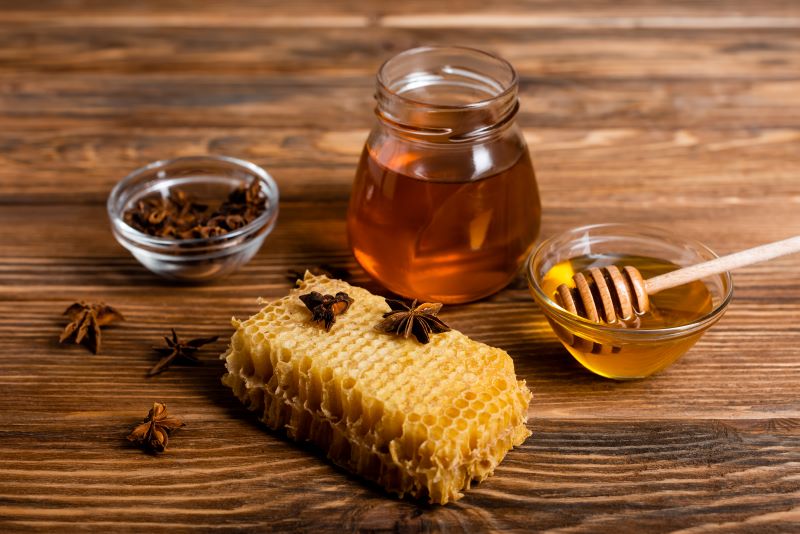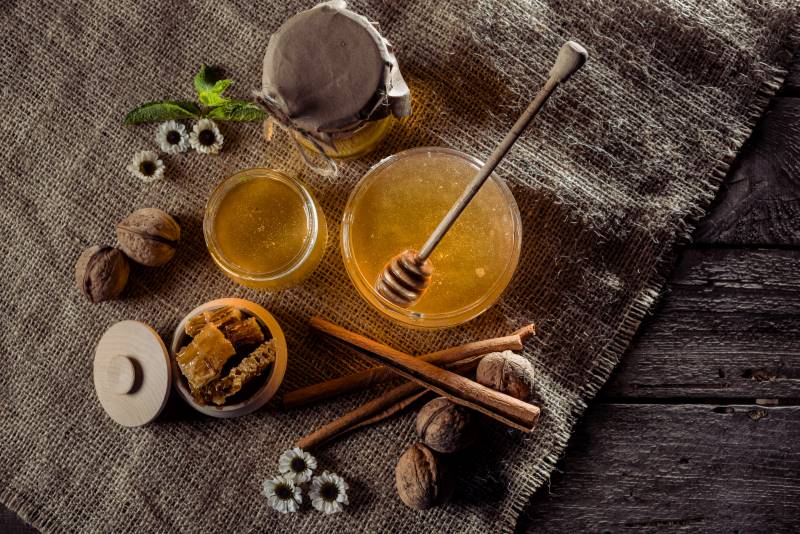Top 10 Health Benefits of Consuming Honey in Your Diet

As a natural sweetener, honey offers a delicious alternative to refined sugars while providing a plethora of nutrients and bioactive compounds. The Benefits of Honey have been celebrated for centuries, revered for its sweet taste and myriad health-enhancing properties.
From its potent antioxidant content to its antimicrobial and anti-inflammatory properties, incorporating honey into your diet can offer a range of health benefits that support overall well-being.

Table of Contents

What is Honey?
Honey is a natural candy substance produced by honey bees from the nectar of flora. Honey, in most cases, is composed of fructose and glucose, along with water, enzymes, and trace amounts of other compounds like vitamins, minerals, and antioxidants.
Bees accumulate nectar from flora and store it in their honeycombs, where it undergoes enzymatic modifications and dehydration, resulting in the thick candy substance we know as honey. People have used honey for thousands of years as a sweetener, meal preservative, and for its numerous health benefits.
Is Honey Good for Health?
Honey provides numerous possible health advantages, such as enhanced blood antioxidant status, wound healing, and heart health. In addition, honey has antioxidants, iron, zinc, and minerals. But because honey contains many calories and sugar, eating too much of it can have negative effects.
10 Benefits of Consuming Honey in Your Daily Diet

Because of its benefits, honey is consumed by people all over the world. It is essential for creating at-home treatments and occasionally serves as a substitute for prescription drugs. Among honey's possible health advantages are:
1. Beneficial to Your Blood Sugar Level
Like other everyday sugars, honey increases blood sugar levels in the body. However, it also protects against related illnesses, such as metabolic syndrome and type 2 diabetes. Additionally, eating it raises the quantity of adiponectin, a hormone that helps manage blood sugar and lowers irritation.
2. Increases Immunity
An additional advantage of honey consumption is that it strengthens your immune device and digestive system. The dietary object has a wealth of antioxidants and antibacterial qualities that aid in the frame's removal of free radicals. It additionally combats sicknesses that arise up from the hobby of microorganisms, viruses, and fungi.
3. Serves as a Natural Aid for Sleep
Having a glass of heated milk with honey in it will assist you in falling asleep at night. Honey causes your brain to release serotonin, which instantly improves your mood, and transforms into melatonin, which controls your sleep cycle.
4. Keeps the Heart Young and Healthy
Since it keeps the coronary heart younger, one of honey's finest health benefits is its capability to save you from coronary heart sickness. More specially, honey lowers blood fat, elevates blood sugar, and modifies coronary heart fee.
5. Heals Wounds and Cuts
The number one sugars in honey are fructose and glucose. That way, the water is instantly absorbed when you use it on your wound. This aids in the restoration manner and keeps any septic from developing. It also prevents bacteria from developing.
6. Treats Cough
Few people know that honey is one of the oldest and simplest natural treatments for dry and wet coughs. Additionally, if you devour one tablespoon of honey daily, you might not have problems with throat soreness.
7. Reduces Sinus Headache Pain
Many people suffer from sinus problems as a result of dangerous routines and accelerated pollution. Viral obstruction of the sinuses, which are tiny areas in the cranium, causes mucus and air to become trapped inside, causing headaches and uncomfortable occasions.
8. Increases the Body's Energy
One approach you could take to unexpectedly increase your body's strength is to drink warm water with honey in it. Honey is a natural sugar that increases athletic overall performance, avoids fatigue, and speeds up your metabolism.
9. Avoids Periodontal Disease
When used regularly, honey can help lessen gum problems, including bleeding, plaque, and gingivitis. It accomplishes this by emitting antiseptic hydrogen peroxide and functioning as an antibacterial agent to prevent the growth of bacteria.
10. Promotes Loss of Weight
Warm water with a squeeze of lime and honey acts as an anti-cellulite remedy by dashing up your frame's metabolism. Honey also aids in appetite law, preventing you from overindulging. Furthermore, honey burns fat for your body while you sleep.
What is the Nutritional Value of Honey?
Studying the nutritional content of Honey is essential for understanding its significance as a source of essential nutrients.
Bees use flower nectar to generate honey, a naturally occurring sweetener. Though honey's nutritional makeup can change based on processing and flower source, it contains a range of nutrients and bioactive substances.
As per this Research, below is the nutritional composition of 100 grams of Honey:
Nutrients |
Values |
| Energy | 304 Kcal |
| Total fat | 0 g |
| Total Carbohydrates | 82.4 g |
| Sugar | 82.1 g |
| Protein | 0.3 g |
| Cholesterol | 0 g |
| Dietary fibre | 0.2 g |
| Vitamin C | 0.5 mg |
| Fructose | 40.9 g |
| Glucose | 35.8 g |
| Potassium | 52 mg |
| Sodium | 4 mg |
How to Include Honey in Your Daily Diet?

Honey, a natural sweetener produced by bees from the nectar of flowers, has been revered for centuries for its nutritional value and medicinal properties. Many people struggle to understand how to benefit from honey's health properties. Therefore, we have included a few below in the points below for their convenience:
- Include it in your drink: One of the finest approaches to taking advantage of honey's fitness benefits is to start your day with a tall glass of heated water combined with lime juice and honey. Alternatively, you can mix it into your espresso or tea.
- Milk and Raw Honey: Before going to bed, a glass of warm milk flavoured with honey is quite calming. Eat in moderation, even before bedtime, as raw honey is thought to be one of the few sugary foods that can control the amount of insulin released into your system.
- Honey Salad Dressings: Honey-based salad dressings are quite tasty. Mix some mustard and vinegar, and season with salt and pepper. Then add it to your salad to make even the most straightforward salads nutrient-dense delights. Toss in some avocado, onions, cucumber, spinach, and raw honey to make this salad considerably healthier.
- Honey-coated Fruits and Nuts: To improve your meal's taste and nutritional value, sprinkle some honey over the fruits and nuts. For a delicious and healthful caramelised treat, drizzle some raw honey over fresh fruit or sprinkle it over fruits like apples or berries before grilling!
- Desserts and Sweets: The most popular and delectable way to utilise honey is in sweets because of its exceptional sweet flavour and creamy texture, which go well with cakes and pastries. Natural honey is preferred by many bakers and chefs over white sugar as their main sweetener.
Different Ways to Include Honey in Your Diet
Honey is a multipurpose substance with many uses for sweetening food, enhancing flavours, and adding nutritional value. Here are a few ideas for incorporating honey into your diet:
- Honey in Water: To make honey in water, just mix a tablespoon with a little warm water and sip. For the ideal detox drink, you can also mix it with some lemon juice and cinnamon powder.
- Tea With Honey: For tea, use honey instead of sugar. Whether it is a robust cup of kadak masala chai or a healthy cup of green and black tea, honey is seen to be a wonderful complement.
- Salad with Honey: Make your vinaigrette by mixing it with honey. Put some lemon juice, olive oil, sesame seeds, and a tablespoon of honey in a bowl. Combine all ingredients and pour over your salad dish.
- Honey in Salad: Add some honey to your salad dressing. Put some lemon juice, olive oil, sesame seeds, and a tablespoon of honey in a bowl. Combine all ingredients and pour over your salad dish.
- Dessert with Honey: This could be among the simplest methods to enjoy desserts without feeling guilty. Make all of your favourite desserts with honey and savour every bite.
The possibilities for adding honey to your diet are virtually limitless; these are just a few suggestions to get you started
Side Effects of Over Consuming Honey
While eating honey in moderation has many health benefits, taking too much of it might have the following negative effects:
- Weight Gain: Honey is high in calories and sugars, primarily fructose and glucose. Consuming large amounts of honey regularly without accounting for the additional calories can contribute to weight gain and obesity.
- Increased Blood Sugar Levels: Honey has a high glycemic index, which means it can cause a rapid increase in blood sugar levels when consumed in large quantities. This can be particularly concerning for individuals with diabetes or insulin resistance.
- Dental Issues: Like other sugary foods, excessive consumption of honey can contribute to dental problems such as cavities and tooth decay. Bacteria in the mouth feed on the sugars in honey, producing acids that can erode tooth enamel over time.
- Digestive Issues: Some people may experience digestive discomforts such as bloating, gas, or diarrhoea when they consume large amounts of honey. This can be due to its high sugar content or individual sensitivity to certain components in honey.
- Risk of Allergies: Honey can contain traces of pollen, which may trigger allergic reactions in sensitive individuals. Over-consumption of honey could potentially increase the risk of allergic symptoms such as itching, swelling, or respiratory problems.
To prevent these negative effects, it's crucial to use honey in moderation as part of a balanced diet. Keep consumption within the suggested serving sizes, and watch out for extra sugars in your diet from other sources.
Who Should Avoid Consuming Honey?
Although honey is generally safe to eat, there are several situations in which it should not be consumed. Among them are:
- Those with allergies: Because honey contains bee pollen, some human beings can be allergic to it. People may potentially revel in extreme hypersensitive reactions because of this. So, honey intake isn't always advocated for anybody with those allergic reactions.
- Infants: Honey should now not accept babies younger than one year of age. This is due to the opportunity of bacterial spores that cause botulism being carried via dirt debris found in honey.
- People with Type 2 Diabetes: Honey is high in natural sugars, primarily fructose and glucose. While it has a lower glycemic index compared to table sugar, people with diabetes should still be cautious about their intake and monitor their blood sugar levels when consuming honey.
- Those with a compromised immune system: People with weakened immune systems, such as individuals undergoing chemotherapy, organ transplant recipients, or those with HIV/AIDS, may be more susceptible to bacterial infections consuming honey.
- Anyone with a history of gastrointestinal issues: Some individuals may experience digestive discomforts, such as bloating, gas, or diarrhoea, after consuming honey. If you have a history of gastrointestinal problems, it's best to consume honey in moderation and monitor your body's response.
Before including honey or any other item in your diet, you must speak with a healthcare provider if you have any questions or concerns about any particular health issues.
Given the formerly listed health benefits of honey, it's evident that this nutritional object effectively prevents illness and even manages the conditions we already have. Not to say, integrating it into our day-by-day lifestyles is straightforward. But be careful—baking or heating honey will have unfavourable effects on the frame.













